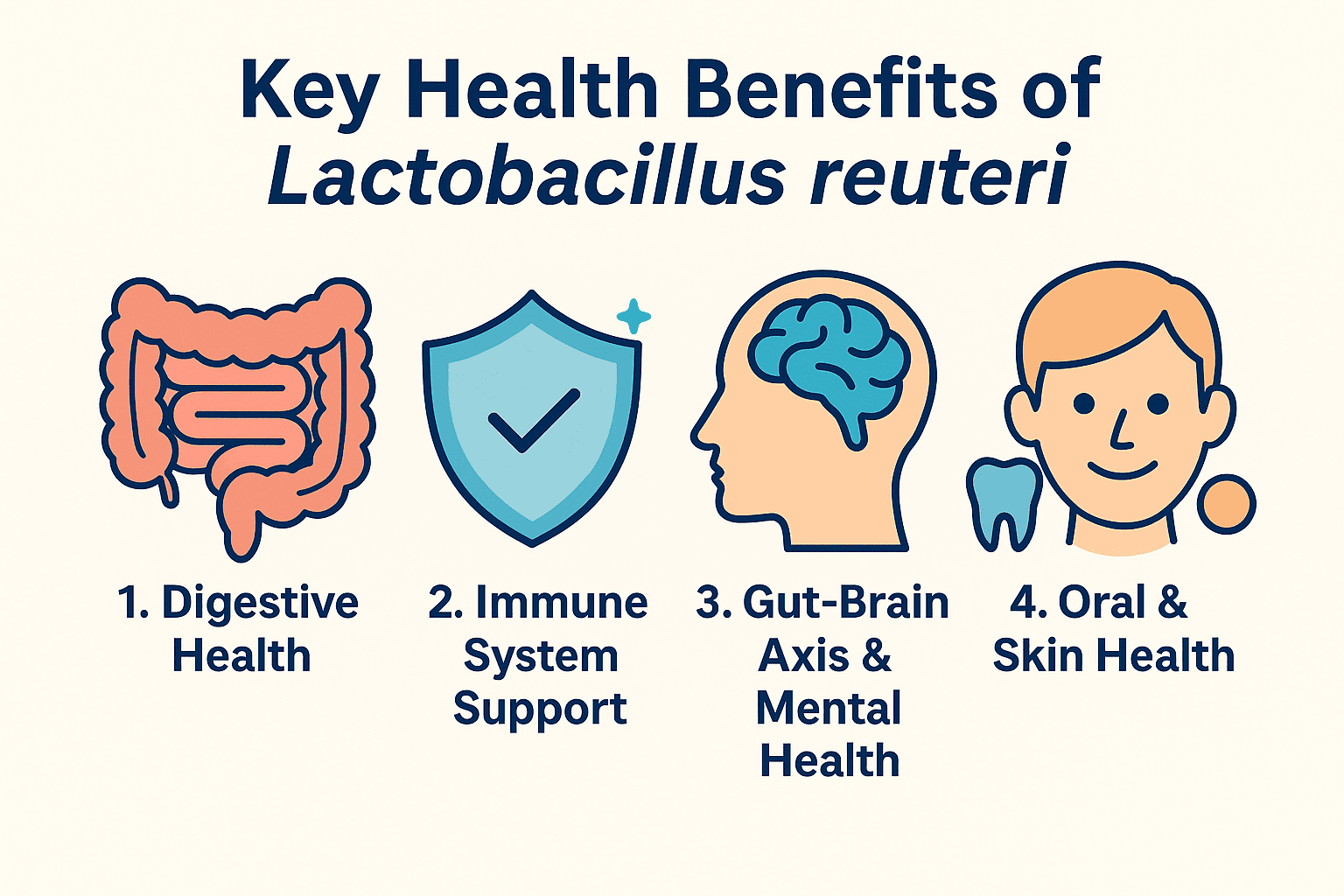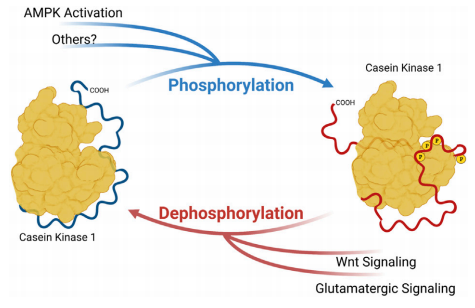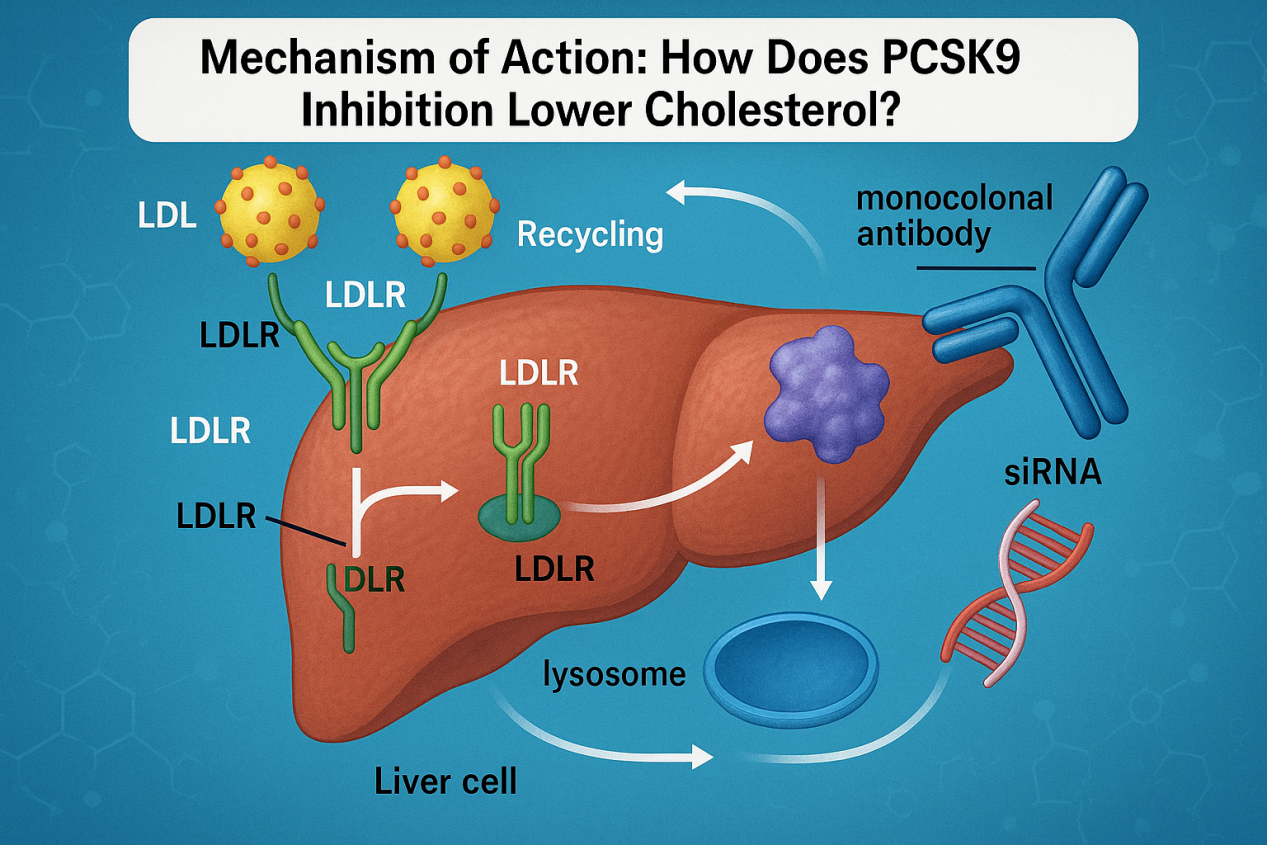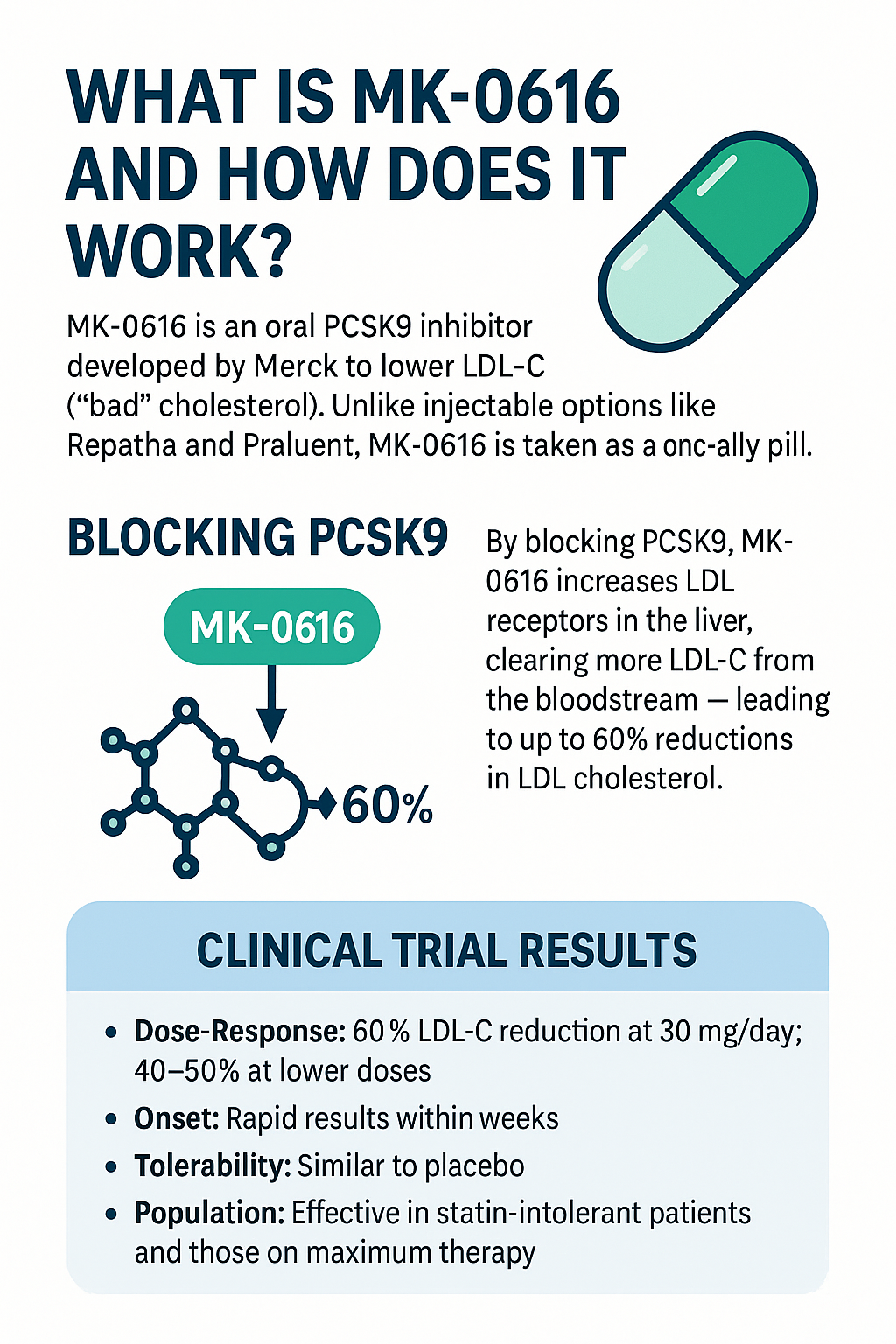Lactobacillus reuteri: The Probiotic for Gut, Mood, and More
Abstract
Lactobacillus reuteri is a probiotic bacterium with scientifically supported benefits for digestive, immune, and mental health. This blog post explores its mechanisms of action, including antimicrobial production, gut barrier support, and interaction with the gut-brain axis. Readers will learn about specific L. reuteri strains (such as DSM 17938 and ATCC PTA 6475), their unique functions, and how to select the right supplements. With a growing body of clinical evidence, L. reuteri is emerging as a versatile and well-tolerated probiotic for individuals of all ages. The article provides practical guidance on sources, dosing tips, and its wide-ranging health applications—making it a valuable addition to any wellness routine.
Introduction to Lactobacillus reuteri
In the growing world of gut health and probiotics, Lactobacillus reuteri stands out as one of the most extensively studied and clinically relevant strains. Known for its ability to colonize the human gastrointestinal tract, oral cavity, and even breast milk, L. reuteri plays a significant role in maintaining overall health through its interactions with the microbiome.
Originally discovered in the 1960s, L. reuteri is a lactic acid bacterium that was traditionally classified under the Lactobacillus genus. However, in 2020, it was reclassified as Limosilactobacillus reuteri to reflect its distinct genetic characteristics. Despite the new taxonomy, it’s still widely recognized by its former name in both clinical and commercial settings.
What makes L. reuteri so unique is its ability to produce reuterin—a powerful antimicrobial compound that helps maintain microbial balance in the gut. Beyond that, certain strains have shown promise in reducing inflammation, improving digestive function, and even modulating mood via the gut-brain axis.
Because it naturally inhabits the human body, L. reuteri is generally well-tolerated and considered safe for all ages, including infants. Its probiotic properties have earned it a place in various supplements and functional foods designed to support gastrointestinal, immune, and mental well-being.
Whether you’re new to probiotics or exploring specific strains for targeted benefits, Lactobacillus reuteri is worth a closer look—especially if your goal is to restore balance from the inside out.
Key Health Benefits of Lactobacillus reuter
Lactobacillus reuteri has been studied extensively for its diverse and impactful health benefits. Unlike general probiotics that broadly support gut flora, L. reuteri demonstrates strain-specific effects on digestion, immunity, mental health, and even skin and oral health.

1. Digestive Health
One of the most recognized benefits of L. reuteri is its ability to support digestive balance. Clinical trials have shown that certain strains (especially DSM 17938) can reduce symptoms of irritable bowel syndrome (IBS), colic in infants, diarrhea, and constipation by improving gut motility and reducing inflammation.
2. Immune System Support
L. reuteri enhances immune regulation by stimulating anti-inflammatory cytokines like IL-10 and promoting regulatory T cells. This makes it helpful in managing chronic inflammatory conditions and even preventing infections.
3. Gut-Brain Axis & Mental Health
Remarkably, L. reuteri has demonstrated influence on emotional and cognitive well-being. Animal studies suggest it increases oxytocin levels, reduces cortisol, and alleviates symptoms of anxiety and depression—paving the way for its use in psychobiotic supplements
4. Oral & Skin Health
Certain strains inhibit the growth of harmful bacteria in the mouth, improving gum health and reducing bad breath. Others have been studied for eczema reduction and improved skin barrier function, particularly in infants and children.
From gut regulation to mood support, Lactobacillus reuteri is a probiotic with multi-system benefits—backed by real science.
How Lactobacillus reuteri Works: The Science Explained
What makes Lactobacillus reuteri such a powerful probiotic isn’t just its presence in the gut—but how it works on a molecular level to benefit human health. From producing natural antimicrobials to influencing hormone activity, L. reuteri supports the body in several fascinating ways.

1. Production of Reuterin
One of the most remarkable features of L. reuteri is its ability to produce reuterin, a broad-spectrum antimicrobial compound. Reuterin helps inhibit the growth of harmful bacteria like E. coli, Salmonella, and Clostridium, promoting a healthy microbial balance in the gut.
2. Modulation of the Immune System
L. reuteri interacts directly with intestinal epithelial cells and immune cells, leading to an increase in regulatory T cells (Tregs) and anti-inflammatory molecules like IL-10. This mechanism helps reduce inflammation and maintain immune tolerance.
3. Communication via the Gut-Brain Axis
Certain strains of L. reuteri are capable of influencing the central nervous system. They help produce neurotransmitters such as GABA and modulate stress hormones like cortisol. These effects explain its growing use in psychobiotics—probiotics that affect brain health.
4. Enhancement of Gut Barrier Integrity
By increasing mucin production and strengthening tight junction proteins, L. reuteri contributes to gut lining integrity. This is essential for preventing “leaky gut” syndrome and systemic inflammation.
Through these mechanisms, L. reuteri acts not only as a gut probiotic but as a multi-functional microbe that benefits various systems in the body.
Best Sources & Supplement Tips for Lactobacillus reuteri
If you’re considering adding Lactobacillus reuteri to your routine, you have two primary options: naturally occurring sources in food and probiotic supplements. Both can be effective, depending on your goals and dietary habits.
1. Natural Food Sources
L. reuteri is found in small amounts in:
Fermented dairy products (e.g., kefir, yogurt)
Traditional sourdough bread
Fermented vegetables, depending on the starter cultures used
However, the levels of viable L. reuteri in foods can be inconsistent and strain-specific. Most people turn to supplements for targeted dosing and reliability.
2. Choosing the Right Supplement
When selecting a probiotic supplement with L. reuteri, look for:
Strain-specific labeling (e.g., DSM 17938 for gut/infant health, ATCC PTA 6475 for inflammation and mood)
CFU count: Aim for at least 1–5 billion CFU per dose
Enteric coating: Protects bacteria through stomach acid
Third-party testing or certifications
Some high-quality brands also pair L. reuteri with prebiotics like inulin to improve colonization.
3. Tips for Maximum Effectiveness
Take probiotics 30 minutes before meals or on an empty stomach
Store them properly—many L. reuteri products require refrigeration
Be consistent: It may take 1–4 weeks to feel benefits
Whether for digestive support or mental wellness, a quality L. reuteri supplement can be a game-changer in your wellness routine.
Conclusion: Why Lactobacillus reuteri Deserves a Place in Your Wellness Routine
As science continues to uncover the intricate connections between our microbiome and overall health, Lactobacillus reuteri stands out as a uniquely powerful probiotic. Unlike general strains, L. reuteri has demonstrated strain-specific benefits ranging from gut regulation and immune modulation to mental well-being and oral health. Its ability to produce reuterin, enhance the gut barrier, and communicate through the gut-brain axis makes it a true multi-tasker in the world of probiotics.
Whether you’re struggling with digestive discomfort, chronic inflammation, or simply seeking better balance in your body and mind, adding L. reuteri—through diet or supplementation—can offer meaningful results. Just remember: not all probiotics are created equal. Choosing the right strain, ensuring viable CFU counts, and being consistent in your routine are key factors for success.
From infants to adults, the growing body of clinical research supports Lactobacillus reuteri as a safe and effective ally in daily health maintenance. It’s more than a supplement—it’s a science-backed step toward better health from the inside out.
References
Johnson, C. L., & Versalovic, J. (2012). The human microbiome and its potential importance to pediatrics. Pediatrics, 129(5), 950–960.
Zheng, J., Wittouck, S., Salvetti, E., Franz, C. M. A. P., Harris, H. M. B., Mattarelli, P., … & Lebeer, S. (2020). A taxonomic note on the genus Lactobacillus: Description of 23 novel genera, emended description of the genus Lactobacillus, and union of Lactobacillaceae and Leuconostocaceae. International Journal of Systematic and Evolutionary Microbiology, 70(4), 2782–2858.
https://www.microbiologyresearch.org/content/journal/ijsem/10.1099/ijsem.0.004107
Walter, J. (2008). Ecological role of Lactobacilli in the gastrointestinal tract: Implications for fundamental and biomedical research. Applied and Environmental Microbiology, 74(16), 4985–4996.
https://journals.asm.org/doi/full/10.1128/aem.00753-08
Jones, S. E., & Versalovic, J. (2009). Probiotic Lactobacillus reuteri biofilms produce antimicrobial and anti-inflammatory factors. BMC Microbiology, 9, 35.
https://link.springer.com/article/10.1186/1471-2180-9-35
Rosenfeldt, V., Benfeldt, E., Nielsen, S. D., Michaelsen, K. F., Jeppesen, D. L., Valerius, N. H., … & Møller, P. L. (2003). Effect of probiotic Lactobacillus strains in children with atopic dermatitis. Journal of Allergy and Clinical Immunology, 111(3), 389–395.
https://www.sciencedirect.com/science/article/abs/pii/S0091674902913734
Dinan, T. G., & Cryan, J. F. (2017). The microbiome-gut-brain axis in health and disease. Gastroenterology Clinics, 46(1), 77–89.
https://www.gastro.theclinics.com/article/S0889-8553(16)30082-6/abstract
Schaefer, L., Auchtung, J. M., Hermans, K. E., Whitehead, D., Borhan, B., & Britton, R. A. (2010). The antimicrobial compound reuterin (3-hydroxypropionaldehyde) induces oxidative stress via thiol depletion. Microbiology, 156(6), 1589–1599.
https://www.microbiologyresearch.org/content/journal/micro/10.1099/mic.0.035642-0
Cox, A. J., West, N. P., & Cripps, A. W. (2010). Obesity, inflammation, and the gut microbiota. Lancet Diabetes & Endocrinology, 376(9741), 1268–1278.
https://www.thelancet.com/journals/landia/article/PIIS2213-8587(14)70134-2/abstract




